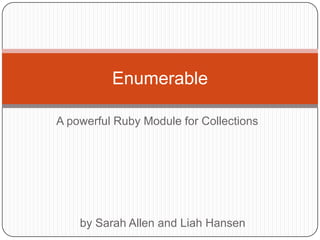
Ruby Enumerable
- 1. A powerful Ruby Module for Collections Enumerable by Sarah Allen and Liah Hansen
- 2. Why Use Enumerables Ruby's Enumerable module has methods for all kinds of tasks which operate on a collection. If you can imagine a use for the #each method other than simply iterating, there is a good chance a method exists to do what you have in mind.
- 3. What does Enumerable Mean? Collection objects (instances of Array, Hash, etc) typically “mixin” the Enumerable module The Enumerable module gives objects of collection classes additional collection-specific behaviors. The class requiring the Enumerable module must have an #each method because the additional collection-specific behaviors given by Enumerable are defined in terms of #each
- 4. Mixing in Enumerable class MyCollection include Enumerable #lots of code def each #more code end end
- 5. View all Classes Mixing in Enumerable ObjectSpace.each_object(Class) do |cl| puts cl if cl < Enumerable end
- 6. Enumerable::Enumerator Struct::Tms Dir File IO Range Struct Hash Array String Struct::Group Struct::Passwd MyCollection StringIO Gem::SourceIndex YAML::Set YAML::Pairs YAML::Omap YAML::SpecialHas
- 7. Test an Instance or Class >> a = [1,2,3] => [1, 2, 3] >> a.respond_to? :any? => true >> a.is_a? Enumerable => true >> Array < Enumerable => true
- 8. Enumerable Methods Collection Behavior
- 9. each Classes that include the Enumerable module must have an #each method. The #each method yields items to a supplied code block, one at a time Different Classes define #each differently Array: #each yields each element Hash: each yields #each key/value pair as a two-element array >> v_names = %w(car truck bike) => ["car", "truck", "bike"] >> v_names.each do |vehicle| ?> puts vehicle >> end
- 10. map The map method modifies each member according to instructions in a block and returns the modified collection of members. >> v_names.map { |v| v.upcase} => ["CAR", "TRUCK", "BIKE"]
- 11. grep The grep method 'searches' for members using a regular expression. >> v_names.grep /a/ => ["car"] >> v_names.grep(/a/) { |v| v.upcase} => ["CAR"]
- 12. find >> v_names.find { |v| v.size > 3} => "truck" >> v_names.find { |v| v.size > 2} => "car" >> v_names.find do |v| v.size > 3 && v.size < 5 end => "bike"
- 13. all? The all? method returns true if all of the members of a collection satisfy the evaluation of the block. Otherwise it returns false. >> v_names.all? { |v| v.length > 2} => true >> v_names.all? { |v| v.length > 10} => false
- 14. any? The any? method returns true if any of the members of a collection satisfy the evaluation of the block. Otherwise it returns false. >> v_names.any? { |v| v.length == 3} => true >> v_names.any? { |v| v = "car"} => true
- 15. Working with Complex Data irb >> load 'vehicles.rb' => true
- 16. inject >> $vehicles.inject(0) do |total_wheels, v| ?> total_wheels += v[:wheels] >> end => 10 >> $vehicles.inject([]) do |classes, v| ?> classes += v[:classes] >> end.uniq => [:ground, :water, :air]
- 17. Complex Operations >> $vehicles.find do |v| ?> v[:name] =~ /Plane/ >> end[:name] => "Plane" >> $vehicles.find_all do |v| ?> v[:name] =~ /Plane/ >> end.collect { |v| v[:name] } => ["Plane", "Sea Plane"] >> $vehicles.find_all do |v| ?> v[:wheels] > 0 >> end.collect { |v| v[:name] } => ["Car", "Truck", "Bike"]
- 18. Complex Operations Continued >> $vehicles.find_all do |v| ?> v[:classes].include? :ground >> end.collect { |v| v[:name] } => ["Car", "Truck", "Bike", "Sea Plane"] >> $vehicles.find_all do |v| ?> v[:classes].include? :air >> end.collect { |v| v[:name] } => ["Plane", "Helicopter", "Sea Plane"]
Hinweis der Redaktion
- its fine to use is_a in irb..in code should use respond_to?
- Our first example below returns any member which contains an 'a'. The grep method also accepts a block, which is passed each matching value, 'collecting' the results returned and returning those as shown in the second example.
